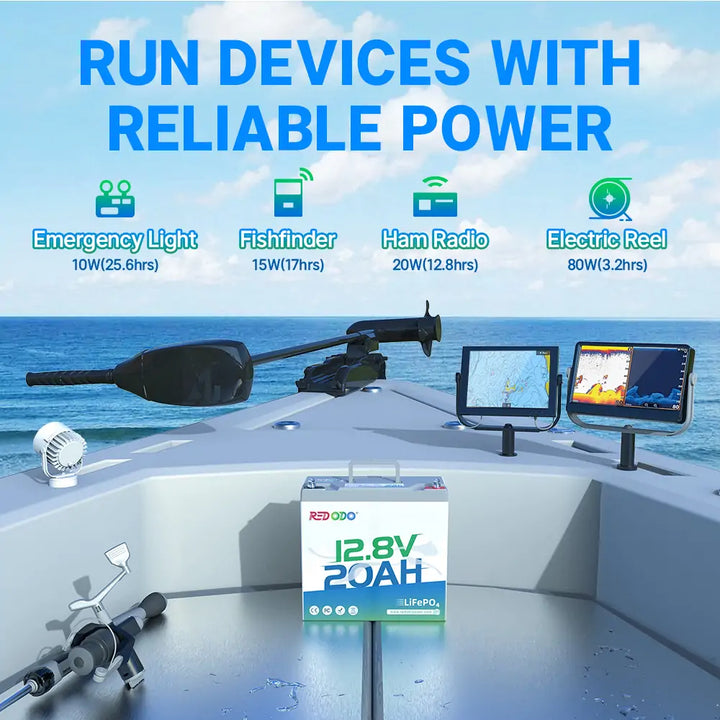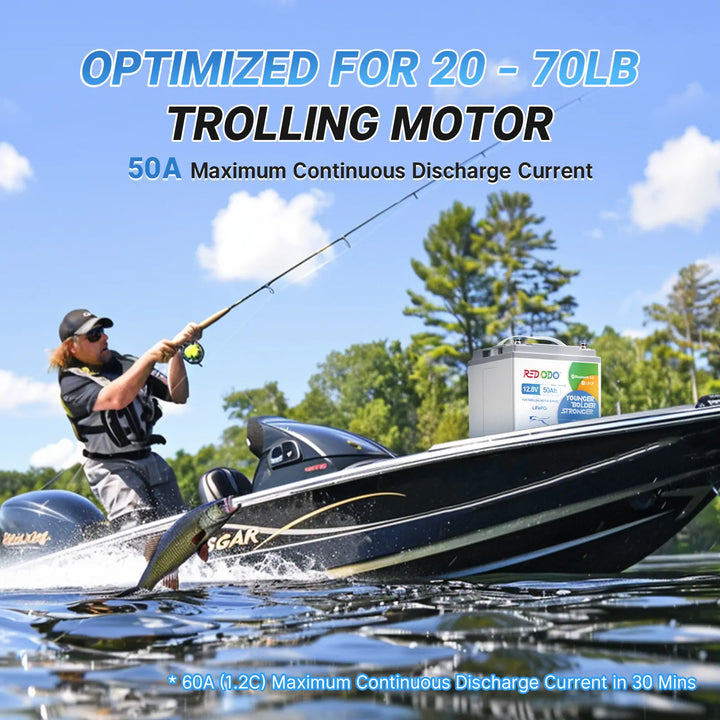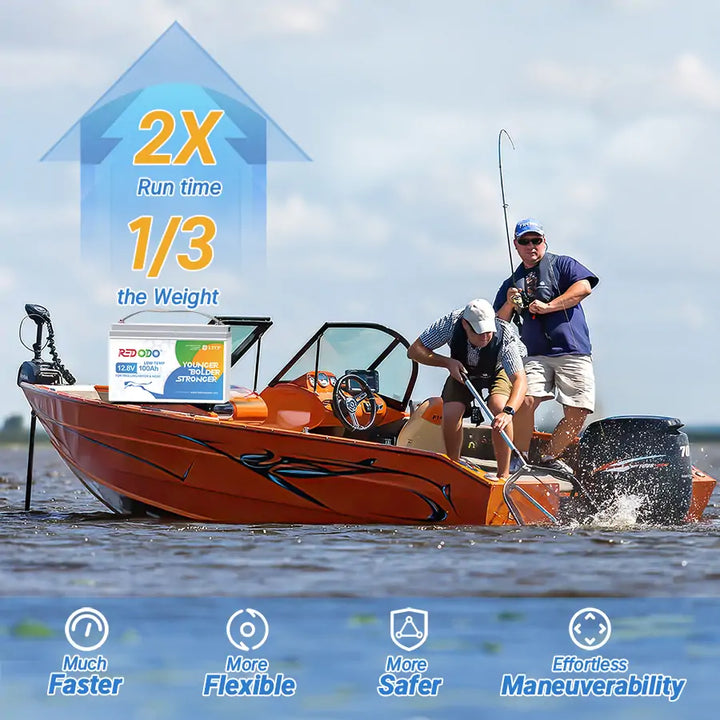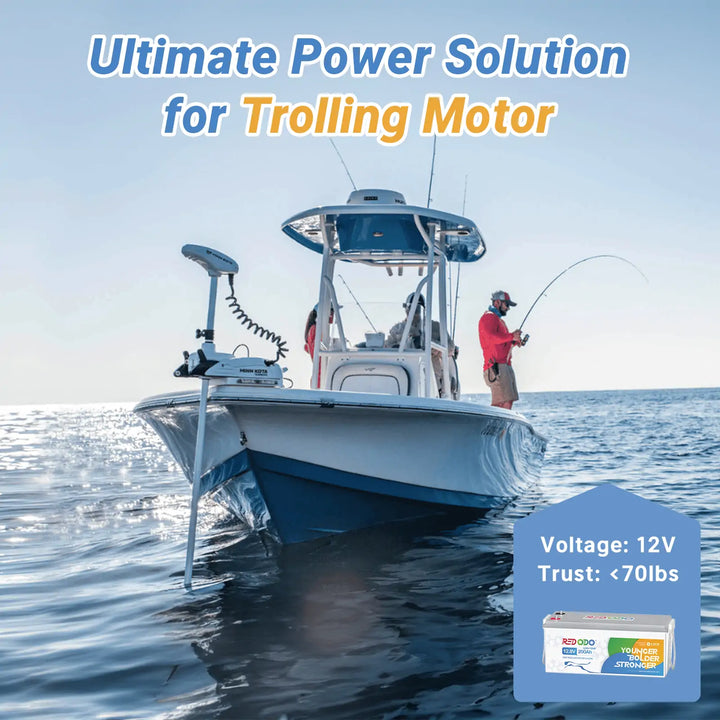Trolling motors are an essential tool for fishing and boating enthusiasts. Choosing the right battery to power them can make all the difference in performance and reliability. One common question is whether a 12V 20Ah lithium battery is suitable for a trolling motor. In this article, we'll dive deep into the pros and cons of using a 12V 20Ah lithium battery, its advantages over other battery types, and how it performs in various trolling motor setups.
Table of Content
- Advantages of Lithium Batteries for Trolling Motors
- Can I Use a 12V 20Ah Lithium Battery for a Trolling Motor?
- Can a 12V 20Ah Lithium Battery Power a Trolling Motor?
- Is a 20Ah Capacity Enough for Trolling Motor Batteries?
- When is a 12V 20Ah Lithium Battery a Good Fit?
- Comparing a 12V 20Ah Lithium Battery to Other Options
- Best Practices for Using a 12V 20Ah Lithium Battery with Trolling Motor
Advantages of Lithium Batteries for Trolling Motors
Lithium batteries, particularly LiFePO4 batteries, offer several advantages over traditional lead-acid and AGM batteries, especially in applications like trolling motors. These benefits include:
- Lighter Weight: Lithium batteries are typically 50-60% lighter than lead-acid batteries of equivalent capacity. This makes them easier to handle and helps reduce the overall weight of your boat, improving fuel efficiency and performance.
- Longer Cycle Life: A typical LiFePO4 battery lasts 3,000-5,000 cycles, significantly outlasting lead-acid batteries, which usually last around 300-500 cycles.
- Higher Efficiency: Lithium batteries deliver nearly 100% of their stored capacity, meaning you can use almost all the energy stored without the voltage dropping off sharply as the battery drains. This provides more consistent power output for trolling motors.
- Faster Charging: LiFePO4 batteries support faster charging, allowing you to get back on the water more quickly.
- Low Maintenance: Unlike lead-acid batteries, lithium batteries do not require regular maintenance, such as topping up with water or checking for corrosion.
- Environmentally Friendly: Lithium batteries are more eco-friendly because they do not contain toxic materials like lead or acid and have a lower environmental impact.
Can I Use a 12V 20Ah Lithium Battery for a Trolling Motor?
Yes, you can use a 12V 20Ah lithium battery for a boat trolling motor, provided that the motor is designed to operate at 12V and the current draw of the motor does not exceed the battery's discharge capabilities.
Here are a few things to consider:
- Compatibility: Ensure that your trolling motor is rated for 12V operation.
- Current Draw: Check the amp draw of your trolling motor. Make sure the motor's draw doesn't exceed the battery's capacity for your intended usage.
- Runtime: Calculate how long you expect to run the motor. For example, if your motor draws 10 amps, a 20Ah battery would theoretically last about 2 hours (under ideal conditions).
- Weight and Size: Ensure the battery’s weight and size fit your boat's setup. Lithium batteries are generally lighter than lead-acid batteries.
Always refer to the specifications of both the battery and the trolling motor to ensure safe operation.

Can a 12V 20Ah Lithium Battery Power a Trolling Motor?
The suitability of a 12V 20Ah lithium battery for a trolling motor depends largely on the size and power requirements of the motor. Most small to mid-sized trolling motors, typically used for kayaks, canoes, or lightweight fishing boats, run on 12 volts, making a 12V lithium battery a compatible option. However, the amp-hour rating (Ah) plays a crucial role in determining how long the battery can power the motor.
Amp-Hours and Trolling Motor Power Consumption
Trolling motors come in different thrust ratings, typically ranging from 30 to 80 pounds of thrust. The amount of power they draw varies based on the speed setting and conditions like wind and water current. Here’s a general idea of how much current trolling motors may draw at different thrust levels:
- 30 lbs thrust: 15-20 amps
- 40 lbs thrust: 20-25 amps
- 55 lbs thrust: 25-40 amps
With a 12V 20Ah lithium battery, the battery can theoretically supply 20 amps of current for one hour. If your trolling motor draws 20 amps, you can expect about one hour of runtime. If it draws less, say 10 amps, you could extend the runtime to about two hours.
Is a 20Ah Capacity Enough for Trolling Motor Batteries?
A 20Ah capacity can power a small trolling motor for short periods, but it may not be sufficient for longer trips or larger motors. For example, if you're running a 30-40 lb thrust motor at moderate speeds (drawing around 20 amps), you’ll likely get 1-2 hours of runtime from a 12V 20Ah battery.
For anglers or boaters who use their trolling motors intermittently, this may be enough. However, for extended use or more powerful motors, you may want to consider a higher-capacity battery, such as a 12V 50Ah lithium ion battery or 100Ah lithium trolling motor battery, which would provide significantly longer runtimes.
When is a 12V 20Ah Lithium Battery a Good Fit?
While a 12V 20Ah lithium battery may not be suitable for all trolling motor setups, it works well under certain circumstances:
- Powering Fish Finders: This battery is a good fit for powering fish finders on your boat, providing a stable and reliable source of energy to ensure accurate readings and functionality throughout your fishing trips.
- Intermittent Use: If you only use your trolling motor for brief periods, such as when maneuvering around fishing spots or making short trips, a 20Ah battery can meet your needs without adding unnecessary weight.
- Camping Lights: A 12V 20Ah lithium battery can power camping lights, offering bright and efficient illumination for your outdoor adventures while being lightweight and easy to transport.
- Backup Battery: A 12V 20Ah lithium battery can also serve as a reliable backup battery to extend your time on the water in case your primary battery runs out.
Redodo 12V 20Ah Lithium Battery is built with EV-grade LiFePO4 cells, offering stable and reliable power for a wide range of small electronic devices. It is ideal for applications such as fish finders, ice fishing, electric fishing reels, lighting, camping, amateur radio, motorized toy cars, and more!
Comparing a 12V 20Ah Lithium Battery to Other Options
When selecting a battery for your trolling motor, you may wonder how a 12V 20Ah lithium battery compares to other options. Here’s a brief comparison:
12V 50Ah Lithium Battery
- Runtime: A 50Ah battery would offer more than double the runtime of a 20Ah battery, providing roughly 3-4 hours for a 30-40 lb thrust trolling motor.
- Weight: While heavier than a 20Ah battery, a 50Ah lithium battery is still significantly lighter than lead-acid alternatives, making it a practical choice for longer trips.
- Cost: A 50Ah battery will cost more than a 20Ah option, but the extra runtime and versatility may justify the price for many users.
The Redodo 12V 50Ah Deep Cycle Lithium Battery features a maximum continuous discharge current of 60A, making it compatible with trolling motors up to 70 lbs of thrust. Additionally, the Bluetooth monitoring function and low-temperature cut-off protection make it well-suited for use in marine environments.
12V 100Ah Lithium Battery
- Runtime: A 100Ah battery provides double the runtime of a 50Ah battery, offering approximately 6-8 hours for a 30-40 lb thrust trolling motor. For larger motors, such as those drawing 40-50 amps, the 100Ah battery could last around 2-4 hours, making it suitable for extended outings.
- Weight: While heavier than a 50Ah battery, the 100Ah lithium battery remains much lighter than equivalent lead-acid batteries, making it easier to handle and transport, especially for longer trips where extended power is essential.
- Cost: The 100Ah battery will be priced higher than the 50Ah version, but the additional runtime and power make it a cost-effective solution for users who need reliable and long-lasting performance on the water.
Redodo 12V 100Ah Lithium Trolling Motor Battery is perfectly tailored for trolling motors of 30-70lbs. It provides constant and steady power for your entire day on the water.
12V 200Ah Lithium Battery
- Runtime: A 200Ah battery provides twice the runtime of a 100Ah battery, giving you 12-16 hours for a 30-40 lb thrust trolling motor. For motors drawing higher amps (e.g., 40-50 amps), you could expect around 5-8 hours of runtime, making it ideal for heavy-duty use or multi-day trips.
- Weight: While the 200Ah battery is heavier than both the 50Ah and 100Ah versions, it still offers significant weight savings compared to traditional lead-acid batteries of the same capacity, making it a great option for boaters who need maximum power without excessive weight.
- Cost: The 200Ah battery will naturally be more expensive, but for boaters who need long, uninterrupted power for larger motors or extended use, the investment pays off in terms of performance, efficiency, and lifespan.
Redodo 12V 200Ah Low-temp Lithium Battery uses A-grade cells for outstanding performance. It’s perfect for solar home systems and outdoors applications, such as home backup power, RV, camping, sailboat.
Best Practices for Using a 12V 20Ah Lithium Battery with Trolling Motor
If you decide to use a 12V 20Ah lithium battery with your trolling motor, here are some tips to maximize its performance:
- Monitor Power Consumption: Pay attention to how much power your trolling motor is drawing, especially at higher speeds. Running the motor at lower speeds can significantly extend battery life.
- Charge the Battery Regularly: Lithium batteries can charge quickly, so make sure you fully recharge them after every use. Avoid completely discharging the battery to preserve its lifespan.
- Consider Parallel Connections: If you need more runtime but still want to keep your setup compact, consider connecting two 20Ah lithium batteries in parallel. This will give you a total capacity of 40Ah without increasing the voltage. You can check out to learn how to Connect Batteries in Series and Parallel.
- Check Compatibility: Ensure that your trolling motor and any onboard electronics are compatible with lithium batteries. Most modern motors can handle lithium technology, but it's always good to check the manufacturer's specifications.
Conclusion
In summary, a 12V 20Ah lithium battery is a viable option for smaller trolling motors, especially those used on lightweight boats, kayaks, or canoes. While it may not offer extended run times for larger motors, it provides an excellent balance of weight, power, and durability for specific applications. For more frequent or longer-term use, consider upgrading to a higher-capacity lithium battery such as a 50Ah or 100Ah model to enjoy longer runtimes and better performance.

Redodo

Redodo
Recent Post

How Long Does a Trolling Motor Battery Last?

Convert RV from Lead-Acid to Lithium Battery: A Complete Guide

How Long Will a 200Ah Battery Run an Air Conditioner?

A Full Review of Redodo 12V 140Ah Group 31 Deep Cycle Battery






![⚡[$220 after Sign-Up] Redodo 12V 100Ah Lithium Trolling Motor Battery With Low Temp Protection](http://www.redodopower.com/cdn/shop/files/Redodo12V100Ahlow-tempbattery.webp?v=1738462317)
![⚡[$220 after Sign-Up] Redodo 12V 100Ah Mini Lithium LiFePO4 Battery | Smallest Battery | For RV, Trolling Motor, Solar](http://www.redodopower.com/cdn/shop/files/Redodo12V100AhMiniLiFePO4LithiumBattery.jpg?v=1739959054)

![⚡[$377 after Sign-Up] Redodo 12V 200Ah Lithium LiFePO4 Battery | 1280W Load Power | For RV, Solar, Off-Grid](http://www.redodopower.com/cdn/shop/files/Redodo12V200ahlithiumbattery.jpg?v=1735892910)
![⚡[$524 after Sign-Up] Redodo 12V 300Ah Lithium LiFePO4 Battery | Replaces 6*12V 100Ah AGM Batteries | RV, Marine, Solar](http://www.redodopower.com/cdn/shop/files/Redodo_12V_300ah_lithium_deep_cycle_battery.png?v=1744797523)
![⚡[$248 after Sign-Up] Redodo 12V 100Ah Plus Bluetooth Marine Battery | For Marine, Trolling Motors, RV](http://www.redodopower.com/cdn/shop/files/Redodo12V100AhOBMOutboardMotorLithiumMarineBattery.webp?v=1743584091)
